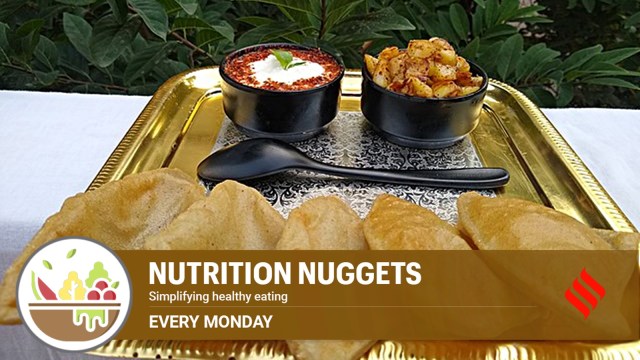Navratri fast nutrition tips: Foods you need to watch and limit
Understanding how vrat foods should be consumed in moderation
 It is essential that vrat foods should be consumed in moderation to maintain a balance. (Wikimedia Commons)
It is essential that vrat foods should be consumed in moderation to maintain a balance. (Wikimedia Commons)Fasting, or vrat, is a deeply rooted Indian tradition, with sattvic foods like fruits, nuts, and grains believed to purify both body and mind. However, while these foods are considered light and nutritious, it’s crucial to watch their quantity and frequency. Overindulgence in fried items or excessive starches can lead to health issues like lethargy or blood sugar spikes, defeating the fast’s purpose. It is essential that vrat foods should be consumed in moderation to maintain a balance.
These are the Vrat foods you need to be watchful about
1.Potatoes: A fasting favorite due to their versatility and quick energy boost, often featured in dishes like aloo sabzi, aloo tikkis, or vrat ke pakode.
Why be careful: Potatoes are high in carbs, and deep-frying them can spike blood sugar and lead to weight gain, especially if you’re prone to metabolic issues. Fried preparations also increase unhealthy fats, which can cause digestive problems and raise cholesterol.
Recommendation: Choose boiled or roasted potatoes for fewer calories and more nutrients. Pair with a salad or yogurt for balance.
2. Sabudana (Tapioca Pearls): A fasting staple, known for its high-calorie content in dishes like sabudana khichdi and sabudana vada, providing quick energy.
Why be careful: Sabudana is high in carbs but low in fiber and protein. Overeating can spike blood sugar and leave you hungry soon after. Plus, cooking it with too much oil adds unnecessary calories, leading to weight gain.
Recommendation: Use less oil when cooking. Pair with protein-rich foods like peanuts or serve with yogurt for better satiety and balance.
3. Kuttu (Buckwheat Flour): A gluten-free, nutrient-rich flour used for fasting dishes like rotis, puris, and pakoras.
Why be careful: Deep-fried kuttu puris and pakoras absorb oil, negating health benefits and causing digestive issues like acidity and bloating when eaten in excess.
Recommendation: Opt for kuttu rotis instead of fried options. Mix with grains like amaranth for a lighter, more nutritious meal.
4. Dairy Products: Common in vrat meals, dairy provides essential nutrients like calcium, protein, and vitamin D.
Why be careful: Excess full-fat milk or cream-based dishes can lead to weight gain and digestive issues, especially for lactose-intolerant individuals.
Recommendation: Choose low-fat or skim milk and limit ghee or cream. Use plant-based options like almond or coconut milk if lactose intolerant.
Photos




- 011 day ago
- 021 day ago
- 031 day ago
- 041 day ago
- 051 day ago


























